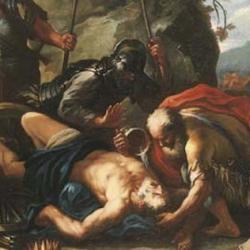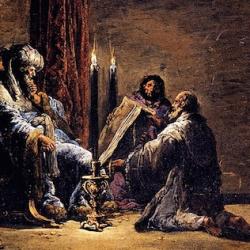1 Chronicles 11–12 form a unit, framed by references to David’s coronation ceremony at Hebron:
A. Gathering at Hebron, conquest of Jerusalem, 11:1–10
B. David’s followers while a fugitive, 11:11–47
B’. David’s host at Ziklag, 12:1–22
A’. Coronation festival at Hebron, 12:23–40
11:1-10 is itself framed by references to “all Israel” (vv. 1, 10), the “word of Yahweh” (vv. 3, 10), and anointing/making David king (v. 3, 10). The B–B’ sequence includes a flashback to a time when David was a fugitive from Saul (B) and when he was settled in Philistine exile (B’). At the beginning, he had only a few followers, but that number grew as leaders from Gad, Benjamin, Judah, and Manasseh defected from Saul to join David at Ziklag. Over the course of the two chapters, David’s company increases from a handful (3 + 30; 47 names in 11:26–47) to a collection of tribes (12:1-22) to an all-Israel of tribes, numbering over 300,000 fighting men (12:23-37).
The few men who joined him at the beginning took a great risk in defecting from Saul to David. No doubt there were mixed motives, including resentment at Saul, but William Johnstone (1 & 2 Chronicles, 1.151–2) captures the Chronicler’s thrust: “These gibborim . . . , individual warriors, are the first to recognize the failing order of Saul is doomed and that only through David can the threat to Israel’s existence from the Philistines be neutralized. . . . Their perceptiveness about the trend of events energizes their natural gifts and enables them to triumph against seemingly impossible odds.” Warriors are canaries in the coal mine; they begin to choke first, and abandon Saul for David. Because they take that risk, they bolster David’s power and open a path for others to join them later.
Triumph over impossible odds – that’s the theme of much of chapter 11. In verses 11-25, the Chronicler recounts a series of adventures. The account is modified from Samuel, in strange ways. He speaks of “the Three” but mentions only two of them; there appear to be two sets of three (v. 21). But the result is a numerologically patterned account:
1) Jashobeam kills 300 at once, v. 11
2) Eleazar and David defend a barley field, vv. 12–14
3) Three fetch water from Bethlehem for David, vv. 15–19
4) Abishai kills 300 at once, vv. 20-21
5a) Benaiah strikes two Moabite sons of Ariel, v. 22a
5b) Benaiah kills a lion in a pit, v. 22b
5c) Benaiah kills an Egyptian giant, v. 23
Five is the number of military power—five fingers to grasp a sword, five in a rank, five heroes/groups of heroes. But these five perform seven mighty acts. They help David form and fill a small cosmos in Israel. The creation symbolism is reinforced when we note that three anonymous heroes do one of the famous deeds; there are four (four corners, four winds) named heroes, three unnamed, for a total of seven. We note other patterns: 2 named + 3 unnamed + 2 named; Jashobeam and Abishai perform the same feat, suggesting an A-B-C-A’-B’ arrangement.
The specific exploits recounted demonstrate the truth of the confession of 11:2: Even while Saul was king, David was the one who led Israel out to battle and back home to celebrate victory. He was designated as future shepherd, but he already functioned as shepherd. While a fugitive, while in exile, he was a better protector and provider than Saul.
David and Eleazar defend a plot of barley against Philistines, and thus stall a Philistine advance. Passover takes place at the barley harvest, so the “salvation” (v. 14) they achieve is linked with the deliverance from Egypt. Barley is food for horses and donkeys and the poor who are the pack humans of ancient near easter society, but David and Eleazar do not think them expendable. They win a victory, and so provide the food of salvation to the poor. David and Eleazar protect and provide; they are shepherds of Israel.
Three of the thirty break through a Philistine garrison at Bethlehem (= “house of bread”) to bring David water from the well at the gate. But David will not drink this unsurpassable water. It’s virtually the blood of men who risked their lives to get it, and David treats it like blood, pouring it out on the ground. David will not exploit the bold prowess of his men. David refuses to refresh himself by sending his men into death. He thus proves himself an ideal king. He will defend a barley field to feed his people; he won’t exploit the prowess of his mighty men for personal gain. They take risks, but he will not make them spear-fodder for the Philistines.
Three of Benaiah’s exploits are recounted (vv. 22-25). He defeats two lion-like Moabites (sons of Ariel = “sons of the lion of God”) and a giant Egyptian, and so defends Israel from foreign invasions. Benaiah’s victory over the Egyptian is reminiscent of David’s over the Gittite Goliath; he takes out a giant with nothing more than a stick and then kills the Egyptian with his own spear, like a weaver’s beam (v. 23; cf. 1 Samuel 17:7). His other task is to kill a lion inside a lion in a pit on a snowy day (one of the most evocative lines in biblical history!). It’s another Davidlike exploit; before David killed Goliath, he had fought lions and bears. Benaiah is a new Samson, killing a lion. He doesn’t get honey from the lion as Samson does (a symbol of the restoration of the land of honey by Samson’s victory over the Philistines). But Benaiah does liberate a well from a lion. Like a later hero, he descends to a pit to fight a beast and to release living water for Israel. He is well-named: Benaiah means “Yahweh has built” but sounds like “son of Yahweh.” As one of David’s heroes, Benaiah protects and provides.
1 Chronicles 11 ends with a long list of David’s gibborim. It is, strikingly, an international force, including an Ammonite (v. 39), a Hittite (v. 41), and a Moabite (v, 46). Israel invaded and conquered the land with a “mixed multitude,” and David reconquers and extends Israel’s territory with a similar force, an army where Israelites of every tribe are knit together with Gentiles into the host of God.
Like Yahweh in the wilderness, David gives bread and water, and thus serves as a figure of another Good Shepherd who offers bread and wine. Jesus too gathers a small band, shepherds Israel while under attack from the established shepherds. Jesus’ band, like David’s grows, and after Pentecost becomes a great company, a new Israel host of God, gathered from all tribes of the earth.















